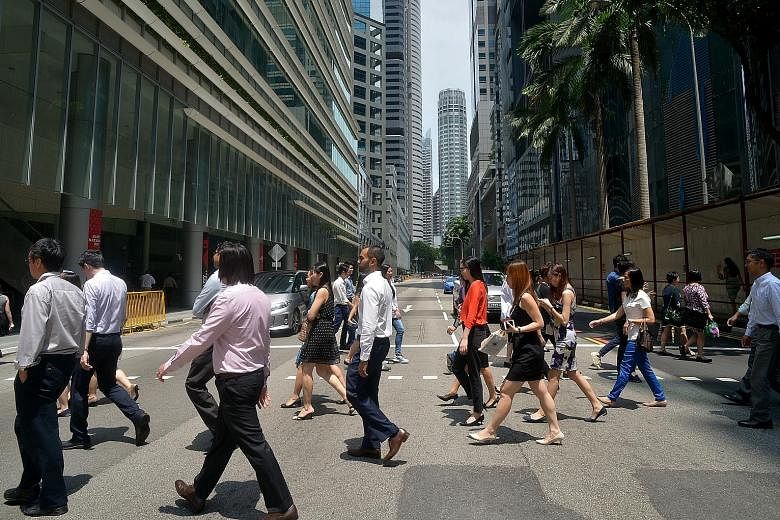HIGHLIGHTS OF THE CHANGES
The new Workforce Singapore (WSG) statutory board will match manpower supply with industry demands by helping workers and businesses adapt to changes and remain competitive, Manpower Minister Lim Swee Say said yesterday.
Born out of the restructuring of the Singapore Workforce Development Agency, the WSGwill come under the Ministry of Manpower (MOM). It will help Singapore face the challenges of an ageing local workforce growing at a slower pace.
The workforce is ageing swiftly. Today, 12 per cent are aged 60 or older, compared to 6 per cent a decade ago. And the forecast is that the total workforce will expand just 1 per cent by 2020, compared to 4 per cent in 2011.
This greying issue coupled with greater global uncertainty, disruptive technologies and slowing growth of the local economy have heightened the need for an inter-government effort to avoid such problems as high youth unemployment and declining labour force participation, Mr Lim said.
Hence, WSG will "sharpen its focus and strive to... maximise matching between jobs and skills, and workers and businesses".
It will work with the Ministry of Education (MOE)and Ministry of Trade and Industry (MTI).
Adapting a phrase popularised by MOE, he said MTI will "make every job a better job" by creating new industries, businesses and jobs, while MOE will "make every worker a better worker" through the new SkillsFuture Singapore agency, which will encourage lifelong learning and upgrading of professional skills.
WSG will make "every career a better career" for Singaporeans, he added.
It will support workers moving into new jobs and industries and help workers, including those with special needs and ex-prisoners, to learn new technologies. It will help businesses operate with a leaner workforce by adopting new business models, and also ensure a strong Singaporean core.
WSG is working with public agencies and tripartite partners to develop manpower plans on the kinds of future jobs needed in each sector.
WHAT MPs SAY
The seven MPs who spoke on the Bill gave suggestions on how to improve the work environment.
Labour MPs Desmond Choo (Tampines GRC) and Patrick Tay (West Coast GRC) said jobseekers need to be better matched to jobs.
With more PMETs (professionals, managers, executives and technicians) being laid off, Mr Choo said MOM needs to spread its effort more to find them relevant jobs. One way is for MOM to work with private placement companies.
Schemes that help workers find jobs need to be constantly upgraded, said Mr Tay. The existing Professional Conversion Programmes which help workers gain relevant skills for specific sectors by sending them for training, "have to be even more responsive, relevant, and flexible across more sectors... because new jobs are created in new areas daily".
Ms Jessica Tan (East Coast GRC) said WSG needs to understand the challenges of workers in non-traditional work arrangements. She noted that the emergence of disruptive technologies, such as Uber, creates new work models.
"There is a need for policies to provide benefits and protection for the diverse work arrangements... we have to start separating a worker's benefits and protection from employment with the company," she said.
Mindsets, too, have to change, said MPs.
Ms Lee Bee Wah (Nee Soon GRC) said companies need to build a culture that accepts flexi- work arrangements.
Nominated MP Thomas Chua hoped WSG can reach out to small and medium-sized enterprises, which often are more strapped for resources than big companies, to help them restructure and adjust to operating with a lean workforce.
Dr Intan Azura Mokhtar (Ang Mo Kio GRC) hoped WSG will look into training retired seniors for community-based jobs, like caregivers for the old or young in their estates.
Mr Louis Ng (Nee Soon GRC) noted that some sectors, like retail and hospitality, are labour-intensive.
To boost productivity in these industries, the jobs need to be redesigned to be more fulfilling as they cannot be automated, he said.
THE MINISTER RESPONDS
Mr Lim said he recognised the need for WSG to stay flexible and responsive to industry demands.
The agency is already studying how Australia and Britain match workers to jobs via private placement companies, and plans to partner employment agencies.
But "no matter how much WSG does on its own, it will not be enough", said Mr Lim, reiterating the importance of the new statutory board forming partnerships with industries.
In doing so, it can help freelancers, he said. WSG has formed ties with associations to reach out to sectors that work closely with freelancers.
"We are going to pay greater attention not just to traditional work arrangements, but to emerging work arrangements as well," said Mr Lim.
He also acknowledged Mr Chua's concerns that SMEs often require all-round support in manpower, technology and funding when they restructure their operations.
One solution is for SMEs to pool resources and invest in machines to boost productivity, said Mr Lim, citing a case of 10 Indian restaurants that teamed up to invest in a central kitchen.
For labour-intensive industries, they can still use technology to mechanise certain tasks, said Mr Lim. He noted that retail staff can use technology to speed up stock-taking, and spend more time serving customers.
Tripartite partners have also been focusing on making companies more family-friendly, said Mr Lim. This includes letting employees work from home, start and end work at earlier hours, and reducing their workload.
"With flexi-place, flexi-time and flexi-load, I will say we are making very promising progress, but obviously a lot more can be done."
He also said WSG is working with the Health Ministry and Ministry of Social and Family Development on a plan that lets retirees do meaningful work in their communities.


